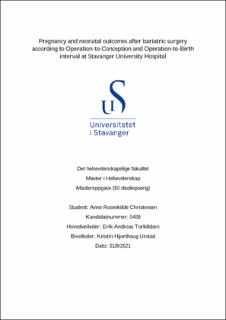| dc.description.abstract | Introduction
Maternal obesity is associated with adverse maternal and neonatal outcomes. Bariatric surgery is an effective treatment for people with harmful obesity who do not achieve lasting weight reduction, and it improves fertility. The aim of this retrospective register-based observation study was to examine the consequences of pregnancy and perinatal outcomes in women who had performed bariatric surgery at Stavanger University Hospital according to Operation-to-conception and Operation-to-Birth interval. In addition, to perform an audit of the quality of the data in the Scandinavian Obesity Surgery Registry Norway (SOReg-Norway).
Material and methods
Data were obtained using electronic patients records and SOReg-Norway. Women eligible for the study had undergone bariatric surgery and subsequently primary delivery of a singleton after 22 completed weeks of gestation. The study population were divided into two-year interval, according to Operation-to-Conception and Operation-to-Birth. 37 patients were included. An audit of patients records from the hospital electronic records were compared to the data from the SOReg-Norway. Main outcome of study was prematurity (gestational age <37 weeks). Secondary outcomes were method of delivery, duration of active labour, induced labour, oxytocin infusion, haemorrhage, sphincter injuries, Apgar score, birth weight and umbilical cord sampling.
Results
In the group with Operation-to-Conception, 25 women got pregnant before two years vs. and 12 women after two year. In the group with Operation-to-Birth, 16 women delivered before two years vs. 21 women after two years. The study group was too small to estimate the risk of prematurity. Secondary outcomes did not show any statistical differences, except in umbilical artery pH in women who got pregnant to years after their surgery, 7.25 vs. 7.30 (p<0.015). But clinically, both values were in normal ranges. The audit found only one woman that were not registered in the SOReg-Norway.
Conclusions
Most women in the study population did not adhere to the recommendation to wait with their pregnancy after bariatric surgery. The study was too small to detect risk of prematurity, but there was a tendency to good outcomes for both women and neonates. SOReg-Norway is a reliable registry for investigating women after bariatric surgery and pregnancy. | |
